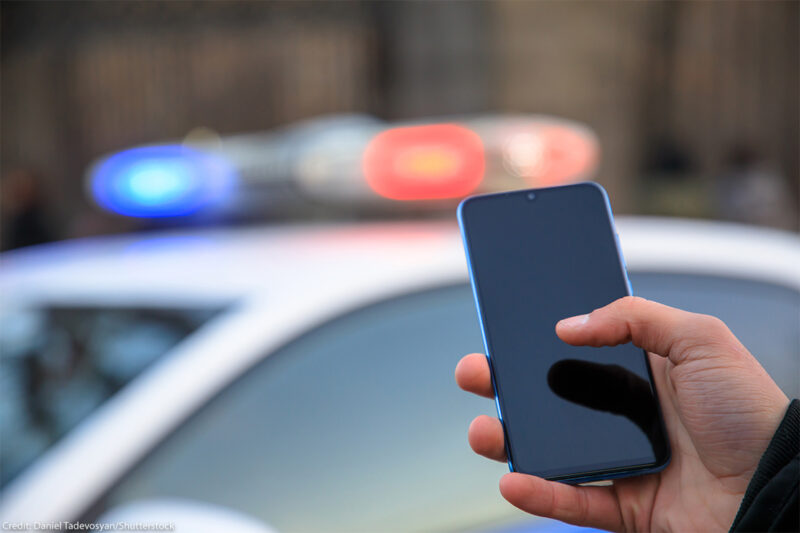Police Want to Treat Your Data Privacy Like Garbage. The Courts Shouldn't Let Them.


Imagine this: You lost your phone, or had it stolen. Would you be comfortable with a police officer who picked it up rummaging through the phone’s contents without any authorization or oversight, thinking you had abandoned it? We’ll hazard a guess: hell no, and for good reason.
Our cell phones and similar digital devices open a window into our entire lives, from messages we send in confidence to friends and family, to intimate photographs, to financial records, to comprehensive information about our movements, habits, and beliefs. Some of this information is intensely private in its own right; in combination, it can disclose virtually everything about a modern cell phone user.
If it seems like common sense that law enforcement shouldn’t have unfettered access to this information whenever it finds a phone left unattended, you’ll be troubled by an argument that government lawyers are advancing in a pending case before the Ninth Circuit Court of Appeals, United States v. Hunt. In Hunt, the government claims it does not need a warrant to search a phone that it deems to have been abandoned by its owner because, in ditching the phone, the owner loses any reasonable expectation of privacy in all its contents. As a basis for this claim, the government cites an exception to the Fourth Amendment’s warrant requirement that applies to searches of abandoned property. But that rule was developed years ago in the context of property that is categorially different, and much less revealing, than the reams of diverse and highly sensitive information that law enforcement can access by searching our digital devices.
The Supreme Court has cautioned against uncritically extending pre-digital doctrines to modern technologies, like cell phones, that gather in one place so many of the privacies of life. In a friend-of-the-court brief in Hunt, the ACLU and our coalition partners urge the Ninth Circuit to heed this call, and hold that even if the physical device may properly be considered abandoned, the myriad records that reside on a cell phone remain subject to full constitutional protection. Police should have to get a warrant before searching the data on a phone they find separated from its owner.
Cases about abandoned property are a poor fit for digital-age privacy
As the Supreme Court recognized more than 10 years ago, when the storage capacity of the median cell phone was a great deal less than it is today, advances in digital technology threaten to erode our privacy against government intrusion if courts apply to the troves of information on a cell phone the same rule they would use to analyze a search of a cigarette pack. In a case called Riley v. California, the Supreme Court held that even though police may warrantlessly search items in a suspect’s pockets during arrest to avoid the destruction of evidence or identify danger to the arresting officers, a warrantless inspection of the information on an arrestee’s phone went too far. Why? Because phones, “[w]ith all they may contain and all they may reveal,” are different.
Here too, the information on a cell phone is qualitatively and quantitatively unlike the items that underpin precedents permitting warrantless searches of abandoned property. The most recent of those precedents was decided in 1988, long before cell phones became a “pervasive and insistent part of daily life.” In case you’re keeping score, 1988 was the year Motorola debuted its first “bag phone,” an early transportable telephone the size of a briefcase that needed to be lugged around with a separate battery and transceiver. In that case, the Supreme Court held that people lose their legal privacy in items, like curbside trash, that they knowingly and voluntarily leave out for any member of the public to see. But when you fail to reclaim a lost or abandoned phone, do you knowingly and voluntarily renounce all of your data, too? Our brief argues that the Ninth Circuit should not use the same reasoning that has historically applied to garbage left out for collection and items discarded in a hotel wastepaper basket after check-out to impute to a cell phone’s owner an intent to give up all the revealing information on their device, just because it was left behind.
Cell phones contain vast amounts of diverse and revealing information, unlike other categories of objects
The immense storage capacity of modern cell phones allows people to carry in their palm a volume and variety of private information that is genuinely unprecedented in cases concerning searches of abandoned property. Our cell phones provide access to information comparable in quantity and breadth to what police might glean from a thorough search of a house. Unlike a house, though, a cell phone is relatively easy to lose. You carry it with you almost all the time. It can fall between seat cushions or slip out of a loose pocket. You might leave it at the check-out desk after making a purchase or forget it on the bus as you hasten to make your stop. Even if you eventually give up looking for the device, thereby “abandoning” it, this doesn't evince any subjective intent to relinquish to whoever might pick it up all the information the phone can store or access through the internet.
Cloud backups mean that the data on a phone often isn’t lost even when the device goes missing
An additional reason that the privacy of the information on a cell phone shouldn’t hinge on a person’s ongoing possession of their device is that you can still access and control much of the data on your phone independently of the device itself. While modern cell phones store extraordinary and growing amounts of data locally, a lot of this information resides also on remote servers — think of the untold messages, contacts, notes, and images you may have backed up on iCloud or its equivalents. If you have access to a computer or tablet, all this information remains yours to view, edit, and delete whether or not your phone is handy. Trade in your cell phone, and you can seamlessly download this information onto a new device, reviewing voicemail messages and carrying on existing conversations in text without interruption. In this sense, a cell phone is more properly analogized to a house key than a house, something we use to access vast amounts of information that’s largely stored elsewhere. It would be absurd to suggest that a person intends to open up their house for unrestrained searches by police whenever they drop their house key. Yet this is essentially the position the government in the Hunt case argued, successfully, in the trial court: Because the defendant discarded his phone, any piece of information stored on that phone was fair game, regardless of whether it was backed up.
The Ninth Circuit has an opportunity in Hunt to correct the trial court’s error and clarify that the rule governing police searches of the information on a lost or abandoned cell phone does not defy common-sense intuitions about what information we mean to give up when we lose track of our devices. The information on your cell phone is highly private and revealing. If the police want authority to review it, the Constitution requires of them something simple — get a warrant.



